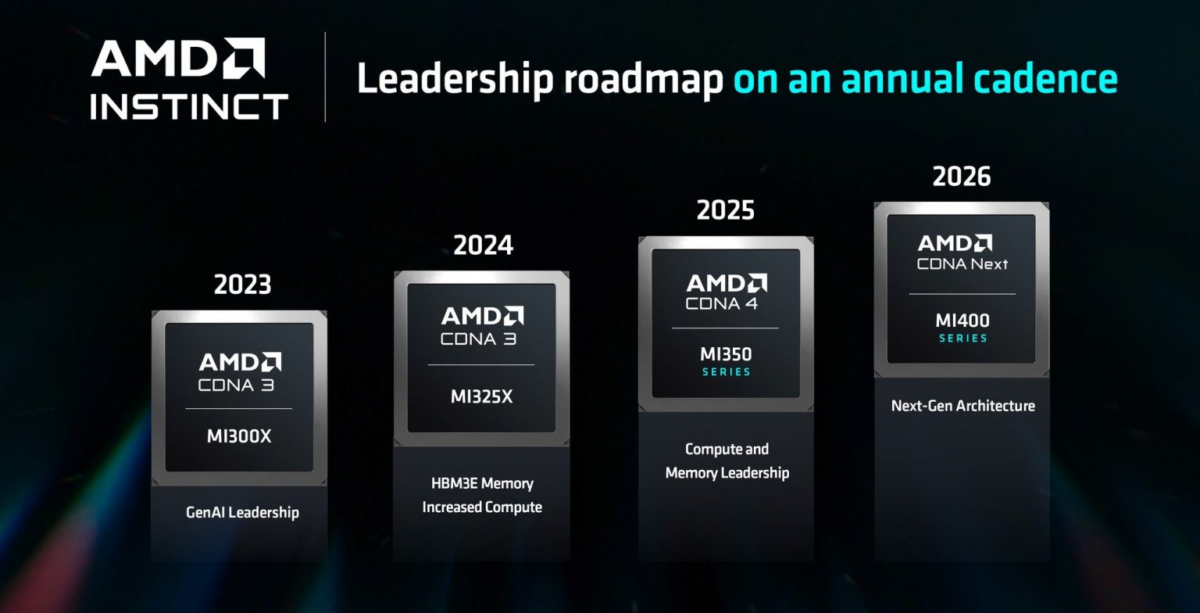Table of Contents
On Monday, Advanced Micro Devices (AMD) unveiled its newest artificial intelligence (AI) processors and shared a comprehensive plan for AI chip development over the next two years, with the goal of challenging industry leader Nvidia. This announcement took place at the Computex technology trade show in Taipei, where AMD CEO Lisa Su unveiled the MI325X accelerator, which will be available in the fourth quarter of 2024.

Image Source: AMD’s new AI processors
The Growing Demand for AI Chips
The surge in the development of generative artificial intelligence programs has driven significant demand for advanced chips capable of supporting these complex applications in AI data centers. AMD has been striving to compete with Nvidia, which currently holds approximately 80% of the market share for AI semiconductors, a highly profitable segment.
AMD’s Competitive Strategy
AMD is following Nvidia’s lead in shortening its product release cycle to annually, a strategy Nvidia has employed since last year. CEO Lisa Su emphasized the company’s commitment to AI, stating, “AI is clearly our number one priority as a company, and we have really harnessed all of the development capability within the company to do that.” Su highlighted the importance of an annual release cadence to meet market demands for new products and capabilities.
Image Source: AMD Ryzen 9000 series processor
Upcoming AI Chip Series
AMD announced a new series of chips, the MI350, expected in 2025 and based on a new chip architecture. The MI350 is projected to outperform the current MI300 series by 35 times in inference, the process of computing generative AI responses. Additionally, AMD revealed plans for the MI400 series, set to launch in 2026, based on an architecture called “Next.”
Nvidia’s Response
Nvidia CEO Jensen Huang announced that the company’s next-generation AI chip platform, Rubin, would be rolled out in 2026, featuring GPUs, CPUs, and networking chips. This highlights the competitive landscape in AI chip development, with both companies striving to outdo each other with advanced technologies and faster product release cycles.
Market Reactions and Financial Impact
Investor interest remains high, with substantial investments in AI-related technology stocks. Despite AMD’s ambitious plans, its shares remained flat, while Nvidia’s shares rose by over 3% on Monday. Since the start of 2023, AMD’s stock has more than doubled in value, whereas Nvidia’s stock has seen a more than seven-fold increase.
Bob O’Donnell, chief analyst at Technalysis Research, remarked on AMD’s bold strategy, saying, “Although the results remain to be seen, it’s clear that AMD is directly challenging Nvidia, and companies seeking alternatives to Nvidia will likely welcome AMD’s announcements.”
Future Sales Projections
In April, Lisa Su mentioned that AMD anticipates AI chip sales of approximately $4 billion for 2024, an increase of $500 million from its previous estimate. AAMD also revealed that its newest generation of “central processor units (CPUs)” is scheduled for release in the latter half of 2024.
AI Integration in PCs
Beyond data centers, AMD is focusing on enhancing AI capabilities in “personal computers (PCs)”. AMD introduced new neural processing units (NPUs) dedicated to handling on-device AI tasks. The integration of AI in PCs is expected to drive growth in the PC market, which has been in a slump for years. PC manufacturers like HP and Lenovo will release devices featuring AMD’s AI PC chips, which exceed Microsoft’s Copilot+ PC requirements.
Conclusion
AMD’s aggressive push into the AI chip market signifies its determination to compete with Nvidia. With new products and a faster release cycle, AMD aims to capture a larger share of the lucrative AI semiconductor market, offering alternatives to companies looking for competitive solutions. The coming years will reveal the effectiveness of AMD’s strategies in the highly competitive AI chip industry.